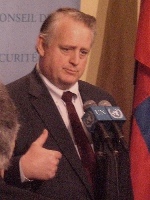US to resume negotiations with Sudan on bilateral ties mid-May
May 4, 2008 (KHARTOUM) — A high level US delegation will arrive in Khartoum on May 20th for talks with Sudanese officials over normalization of ties between the two countries, Sudanese media reported today.

The Sudanese delegation Williamson met with in Rome last month was headed by Sudan presidential adviser Nafi Ali Nafi and included Sudan’s spy chief Salah Gosh as well as foreign minister Deng Alor.
The head of US affairs in the Sudanese foreign ministry Abdel-Basit Al-Sanoosi told Al-Sahafa that “the dialogue will continue discussing outstanding issues within the roadmap agreed upon between two countries”.
The New York Times (NYT) obtained a series of documents exchanged between Washington and Khartoum on a series of steps to normalize relations between the two countries. The documents were leaked by an unidentified US official described as being “critical of the administration’s position”.
The report said that the Bush administration could remove Sudan from an American list of state supporters of terrorism and normalize relations if the Sudanese government agreed, among other steps, to allow Thai and Nepalese peacekeepers as part of the peacekeeping force.
However Williamson told US lawmakers that the report is “not accurate” and that if it was “he would not defend it and would not engage in it”. He further said that it was the Sudanese government which approached Washington on the requirements for normalizing ties.
“Concrete, verifiable, significant progress must be achieved on the ground before we can contemplate improved relations” Williamson said.
Last week the Sudanese government decided to release containers belonging to the US embassy that was being held by custom authorities in Port Sudan for over a year. The containers contained equipments that were to be used for new embassy complex in south Khartoum that was under construction for over two years.
The daily Al-Sharq Al-Awsat quoting unidentified Sudanese official said that the US administration agreed to “re-open a bank account for the Sudanese embassy in Washington” in return.
But Al-Sanoosi hinted to the newspaper that the US has not fully removed restrictions imposed on the Sudanese embassy yet despite earlier reports of the tradeoff between the two sides.
“Currently there are positive steps regarding the financial restrictions on the Sudanese embassy in Washington” he said.
The US Charge d’Affaires Alberto Fernandez said in press statements at the SPLM office in Khartoum, where he extended condolences on the death of South Sudan’s defense minister that relations are in a “transitional period between hatred and normalization”.
He added that normalization will depend on setting the priorities between the two sides “to preserve their dignity”.
However the powerful figure Nafi Ali Nafi said in statements reported by Sudan news agency (SUNA) that his country “accepts a balanced relationship with the US away from political trusteeship or imposing of special agendas”.
Williamson told a group of Darfur activists in a conference call sponsored by Enough Project from Washington that he does not foresee improvement of ties with Sudan “during his tenure”.
“There has to be changes on the ground before any improvement in relations” the US envoy said.
He further said that tougher sanctions remain an option on the table if the US president Bush deems them necessary.
The US imposed sanctions on Sudan in 1997 when Clinton’s administration issued an order prohibiting the imports of Sudanese goods or exports of US technology and goods to the East African nation because of the country’s alleged support of international terrorist activities.
The Bush administration stiffened sanctions on Sudan throughout the years in response to intensification of the Darfur crisis.
(ST)
